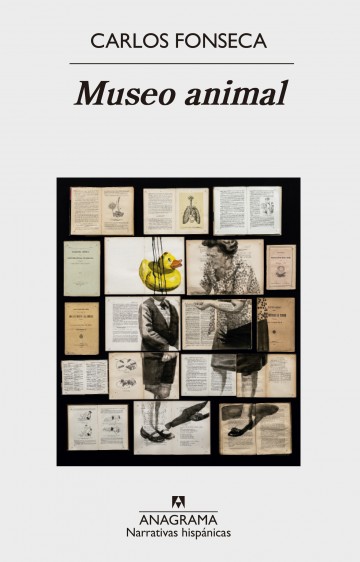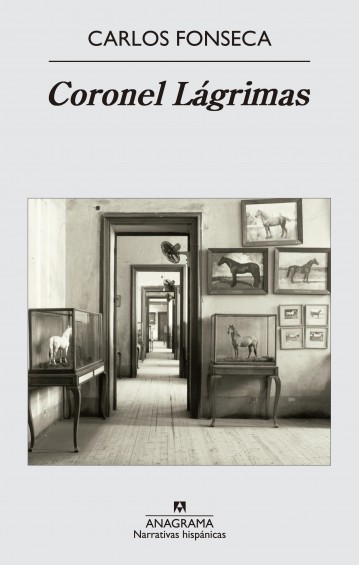| PAGES | 432 |
| SERIES | Narrativas hispánicas |
| PUBLICATION | 06/09/2017 |

SERIES:Narrativas hispánicas
Best Book of 2017 according to El Mundo / El Cultural
In the midst of the excitement about the arrival of a new millennium, a Caribbean curator receives an invitation from a celebrated fashion designer to collaborate on a strange exhibition (both of them share a fascination with the forms of the animal kingdom). Seven years later, after the failure of the project, the curator recovers – following the death of the designer – the archive of their potential collaboration. That’s when he discovers, during a long night of insomnia and reading, that behind the delirious project are clues hidden that reveal the strange saga of the designer’s family: a vertiginous puzzle that leads us to an epic story of political escapades through the Latin American jungle. On the way, a cast of memorable characters are encountered, whose own work questions the unstable frontiers between art, science, politics and religion: a man obsessed with the paintings of Edward Hopper, a designer determined to create a picture of the face of subcomandante Marcos, an old photographer who creates models of ruined cities, a retired model who is now a conceptual artist and prisoner, a young woman trying to prove that behind the history of fashion hides the story of camouflage, a woman who can’t resist spreading fake news and a young native American who has seen the approach of the end of the world. A journey of discovery that ends with the realisation that behind the tedium of normality lies the theatre of obsession.
Half way between the conceptual conspiracies of Don DeLillo and the errant fiction of W.G. Sebald, Museo Animal is the portrait of a world trapped between faith and irony, between tragedy and farce. A defiantly contemporary and impressively ambitious novel that confirms Carlos Fonseca as one of the most daring writers of his generation.
«A book of unstoppable energy, remarkable cultural density, stunning intuitive flashes and enormous narrative beauty» (Carmen Dolores Hernández, El Nuevo Día).
« [A] torrential and often hypnotic novel, that follows a straight narrative path but which occasionally takes meandering detours to show us the beauty of the surroundings and, after marvelling us, returns us to the principle route […]its imagination, as I said at the beginning, its astonishing […]this is the book that has most moved me this year. Carlos Fonseca has written a fabulous work: one of those books that, after reading, leaves you not knowing whether to be grateful or simply envious. In the end, they both lead to the same conclusion: a recommendation that you read this author» (Santi Fernández Patón, Eñe, Revista para Leer).
«Fonseca has written two books to date, both published at Anagrama, which have made him one of the most original writers on the Latin American literary scene. His books represent a turning point, opening up a path that will possibly lead to the future of literature, to the fiction that is coming in the XXIst Century. […] [it is reminiscent] of one of the strangest and most revered books in Argentinean literature Museo de la novela de la eterna, by Macedonio Fernández. […] There are books, and authors like Fonseca who seem to have arrived from the future to tell us that tradition and poetics will always survive the ‘real’ world and its fashions» (Sur Acapulco).
«Enrique Vila-Matas … Georges Perec … W.G. Sebald… In that intimate but fertile style, Carlos Fonseca (San José de Costa Rica, 1987) has taken his first significant steps in just a handful of years. Passionate about historical facts and able to mould events so that they fit into his conceptual framework, the writer from Costa Rica creates seemingly insoluble puzzles with a strong and lasting thread, sufficient to involve the reader in a gradual understanding; surrounding them with overlapping mirrors, taking them to where the facts reveal themselves» (Marvel Aguilera, Revista Kunst).
«Museo animal plays with the form of the philosophical novel and pushes the game to the limit. It is a story about the strange nature of identity, about how to disappear, about how “all beginnings are just repetitions” and how “all stories are stories of ruin”. Fonseca has notable narrative skill, which allows him to fracture the story he is telling into a myriad of broken mirrors, configuring a serial discourse in constant transformation. […]. Despite their evident differences, the two novels by Fonseca seem to share a similar gestation: both are stories of the process of creation, the workshop of fiction, about the place where the note becomes an adventure, and life a vital exploration of writing. The great German philosopher Hans Blumenberg would have exploded with joy on reading this novel, which tells us that “learning to write is to make shipwrecks”. And the reader can only applaud wildly on discovering the marrow of the bone that supports the framework of Museo animal: "the idea is to write a book as bloody immense as that monumental panorama [the Grand Canyon]”. This is a novel waiting to be filled, replete with dust and air, a geological novel that portrays in an instant the monumental passing of time. It is novel as archive» (Ricardo Baixeras, El Periódico).
«One of the best books written in Spanish this year. Fonseca’s narrative, which is intelligent, evocative and atmospheric when it needs to be, and analytical and precise at other moments, has the obsessive energy of the best of American postmodernism, yet, at the same time, it is completely its own» (Nadal Suau, El Cultural, El Mundo).
«Without aspiring to clairvoyance, we can already say that Museo animal both represents and anticipates the arrival of the New Latin American novel. Fonseca’s work contradicts the ‘crisis of the novel’, which many are talking about. With a little more than 400 pages, Museo animal constructs an allegory of today, in which ideology, hope and utopia are destroyed in the face of stories, holograms and fake news. A nomadic journey, where art is reduced to a grotesque grimace and the idea of family becomes a painful scar, where, despite everything, disappointment gives way to lucidity. A novel that uses literary truth to take us the edge of the abyss with risk and authenticity» (Félix Terrones, Librújula).
«A novel of ideas, yes, but also a passionate tale of lives in thrall to the constant search for meaning; a search that is clearly useless a priori because meaning is something that is always beyond the limits of experience. The art of Carlos Fonseca consists in telling us about those lives that “cheat death by remaining anonymous and camouflaged” within the pages of an astonishing and challenging work of fiction» (Rubi Guerra, Colofon Revista Literaria).
«What is the Latin American literary revelation of 2017? Museo animal by the author from Costa Rica, Carlos Fonseca» (Fernando Iwasaki, ABC).
«One of the best young writers from Latin America» (Inés Martín Rodrígo, ABC).
«A vehement and fascinating book. Within the meta-fiction and the nods to philosophy, Museo animal is, above all, a novel written with an entertaining, agile and dazzling language, using a powerful imagination that transports us directly to each one of its locations and situations. Fonseca is, without any doubt, one of the best of the emerging generation of Latin American writers.» (Enrique D. Zattara, Revista Vísperas).
«Carlos Fonseca takes risks with every sentence. He gambles with his life. Fonseca always goes further and his writing hides an original voice that imagines new territories and new worlds inhabited by characters who are in search of an escape route, finding themselves through their anonymity» (Luis Reguero, Público).
«Fonseca’s literary influences include Coetzee, Piglia, Don DeLillo and Sebald. These companions give his original story a solid field of action. The Costa Rican author is unafraid to get into the literary ring with his gloves ready for action.» (El Financiero, Mexico).
| PAGES | 432 |
| SERIES | Narrativas hispánicas |
| PUBLICATION | 06/09/2017 |
TRANSLATION RIGHTS SALES
- USA (Farrar, Straus & Giroux)
- Turkey (Metis Kitap)


Carlos Fonseca was born in San José, Costa Rica, in 1987. He spent half of his childhood and adolescence in Puerto Rico. He obtained his doctorate in Latin American literature from Princeton University. He has collaborated with literary magazines like Bazar Americano, Buensalvaje and Otra Parte, among others. He is a founding member of the critical review The Roommate. He currently lives in London. In December 2016 he was elected among the best twenty Latin American writers of the 80s at the Guadalajara Book Fair in Mexico and in May 2017 he was included in the Bogota39 list of the best 39 Latin American writers under 40 organized by the Hay Festival every 10 years,



